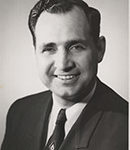Posted: 8/8/03
LifeWay Explore the Bible Series for Aug. 17
The body's most powerful muscle–the tongue
James 3:1-12, 17-18
By Jim Perkins
Madison Hills Baptist Church, San Antonio
We need to change the words to the old saying we repeated as a child: “Sticks and stones can break my bones, but words always will have the power to hurt me (and every person).”
Consider your accountability
James began chapter 3 of his letter with a statement based on truth and served as a warning: Christians teaching the great truths of the word of God will be held to a high degree of accountability for their teaching. Perhaps that accountability was due not only to the vital importance of the subject material, but also because of the widened sphere of influence of the teacher. In verse 1, James evidently included himself as one of these teachers held accountable (“we who teach”); he did not, however, recommend that anyone should pursue that responsibility.
 |
Let us be careful not to misinterpret James at this point. Every believer is responsible for what he or she says, as James strove to explain in the remaining portion of chapter 3, and especially in verse 2: “We all stumble in many ways.” Because of that, fidelity to the Lord and personal responsibility for every word spoken was a theme highlighted in every chapter of his letter (read 1:26; 2:12; 3:1-12; 4:11-12; 5:9, 12).
Take control
According to 3:2, any individual who consistently controls the tongue gives evidence of an admirable spiritual maturity. That maturity, in turn, equips one for the challenges and opportunities of life.
That this control of the tongue is both extremely vital and extraordinarily difficult was the focus for James in the three illustrations he included in verses 3 through 8. Specifically, three small and what might appear to be somewhat powerless elements (a bit, rudder and small spark) are capable of exerting tremendous influence over diverse situations and the lives of others. A one- pound bit can control a thousand pound horse, a large ship driven by powerful winds can be controlled by a small rudder and a tiny spark can start a ravaging forest fire. So also is the tongue a “small part of the body,” yet it is capable when steered by evil of firing up a “world of evil among the parts of the body (the individual and the church body)” (3:5, 6).
The effort to control the tongue and invest its energies in that which is positive and edifying might be difficult, but it is possible. Remember, the same Holy Spirit who brings “love, joy and peace” also produces the fruit of “gentleness and self-control” (Galatians 5:22-23)–a control that can guide the tongue in proper speech.
Seek consistency
James included an appropriate example in 3:9-12 of a problem in the churches that illustrated the challenge facing his fellow believers as they sought to control their tongues. We all (both then and now) tend to be people who participate in a worship rich in praise to God yet impoverished by its paucity of encouragement for fellow believers. Notice how James chose to illustrate the duplicity characteristic of their (and our) worship and lives–they praised God out of one corner of their mouths and cursed those made in his image (Genesis 1:26) from the other corner of their mouths.
Our consistency in speech should mirror that which we find characteristic of God's creation: The spring brings forth fresh and not salty water, and the tree and vine bring forth fruit consistent with their kind and appropriate to the season (3:11-12). As it is easy to grasp the logical necessity of this, so it must be apparent to us that speaking well of God must be accompanied by speaking well of and edifying his people.
Be careful
To bring this section to an appropriate conclusion, James mentioned two kinds of “wisdom” in 3:13-18. In so doing, the author provided his readers, and us, with yet another practical application of his teaching concerning self-control and wise use of the tongue.
The believer who desires to display the life and mind of Christ in his or her person will recognize that the first kind of “wisdom,” mentioned in verses 14-16, actually is a display of the attitudes and actions of the world separated from God. This wisdom is characterized by “bitter envy and selfish ambition” that divides and destroys the church, promoting “disorder and every evil practice” (3:14, 16). These attitudes and actions speak in the worst way of that which is “earthly, unspiritual, of the devil” (3:15), and probably could be thought of as giving rise to the “cursing” of verse 10.
The wisdom God gives, as might be expected, produces the exact opposite attributes in his people. Where there would have been strife and envy, now life is characterized by the outflow of those attitudes and actions that are “pure; then peace-loving, considerate, submissive, full of mercy and good fruit, impartial and sincere,” resulting in a “harvest of righteousness” (3:17-18).
Questions for discussion
![]() What is the greatest challenge you face in “controlling the tongue”? What about your church?
What is the greatest challenge you face in “controlling the tongue”? What about your church?
![]() How can you and your (small) group react proactively to redirect speech in a positive direction?
How can you and your (small) group react proactively to redirect speech in a positive direction?
Sign up for our weekly edition and get all our headlines in your inbox on Thursdays













We seek to connect God’s story and God’s people around the world. To learn more about God’s story, click here.
Send comments and feedback to Eric Black, our editor. For comments to be published, please specify “letter to the editor.” Maximum length for publication is 300 words.